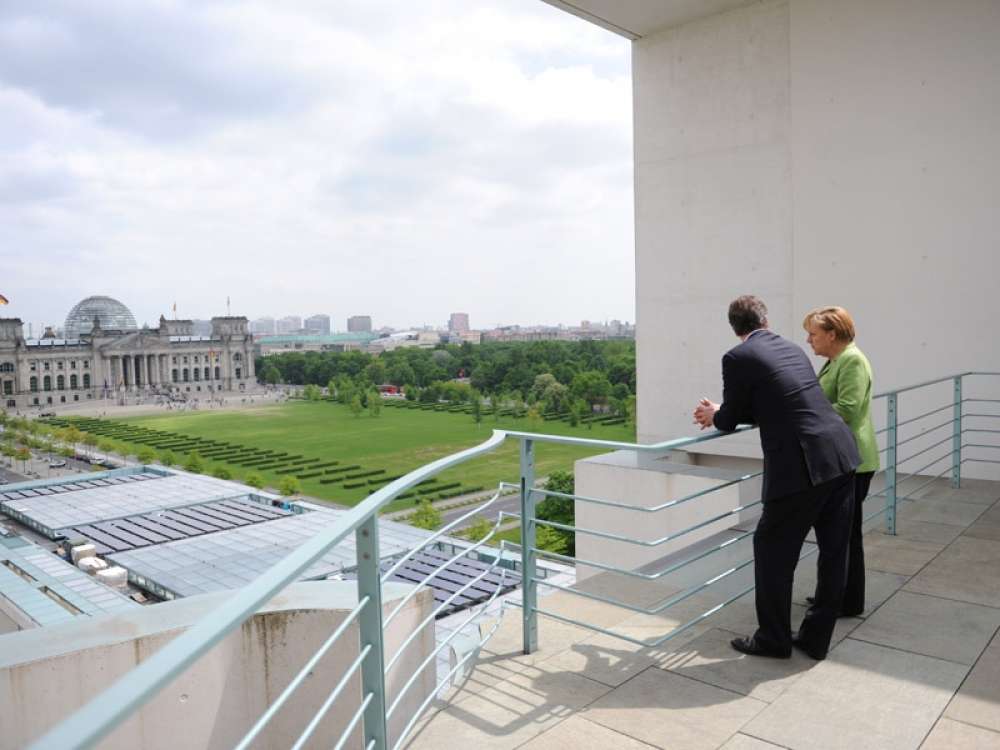Commentary
Europe’s Lonely Liberal Hegemon

Source: Number 10 / Flickr
03 Feb 2016,
published in
Politico Europe
Other Languages
For Oxford economics professor Paul Collier things are crystal clear: “Angela Merkel is responsible for the refugee crisis. Who else?”
It would be easy to dismiss Collier if he were not part of a growing chorus that sees Germany’s refugee policy as a morality play — with Merkel in the lead, chasing redemption for Germany’s historical sins.
The late Lord Weidenfeld talked about a German public enthralled by its naïve welcome to refugees “as if that was a way to redeem the sins of the grandparents.” Hungarian Prime Minister Viktor Orbán accused Merkel of “moral imperialism.”
Merkel’s supporters are equally tempted to qualify her refugee policy in terms of morality. In an address to the German parliament, Holocaust survivor Ruth Klüger expressed her admiration for Merkel for opening the doors to Syrian refugees, saying her “heroic” position had “won Germany the applause of the world.”
Whether seeing it in a favorable light or not, considering Merkel’s stance on refugees as a moral issue does not reflect what really motivates the German chancellor and will determine her decisions in the coming months.
At the heart of Merkel’s refugee policy is a concern for Europe. Ahead of many of her peers, Merkel argued that the migration issue posed a more severe challenge than did the eurozone debt crisis. She saw how woefully unprepared the EU was for the massive influx.
The EU was ignoring the deplorable living conditions of refugees in Turkey, Lebanon and Jordan; its unsecured external borders and ramshackle asylum systems in Greece and elsewhere; the safe haven for human traffickers in Turkey and other Mediterranean countries. There was no Europe-wide solidarity mechanism for the distribution of refugees, and populist politicians fueled anti-Muslim hatred — some, like Orbán, even from the prime minister’s perch.
As the situation spiraled out of control last summer, Merkel was clear-sighted about the dangers faced by Europe, and Germany in particular as the country that benefited most from European integration. A humanitarian catastrophe brewed at the heart of the Continent, tensions rose in the Balkans, and the Schengen passport-free travel zone threatened to implode.
Merkel concluded that Germany was the only EU country in a position to provide emergency relief: It has a strong economy (lending itself to the narrative that Germany’s labor market can easily absorb refugees), a favorable media environment, and the absence of a powerfully organized right-wing populist movement.
Merkel opened the doors to the refugees Hungary didn’t want because she accepted Germany’s role as Europe’s default liberal political hegemon — redemption and moral superiority were not driving factors. Germany’s willingness to act as a temporary “protection giver of last resort” reflected its desire to avert a humanitarian disaster at the heart of the EU and buy the Continent time to come up with a multilateral solution to the crisis.
It was always clear that this move would come at a high cost. Merkel is under no illusions that the German electorate is any more virtuous than those of its European neighbors. But she was willing to invest her political capital and temporarily bear the political costs at home. In doing so, she has pursued unsentimental realpolitik.
Merkel has advocated securing Europe’s external borders and establishing so-called “hot spots” in the EU’s border states, denying refugees the right to choose their country of asylum within Europe. She supports expanding the list of “safe countries of origin” and cutting deals with Turkey’s Recep Tayyip Erdoğan and questionable regimes from Algeria to Eritrea (where she sent her development cooperation minister in December).
At the same time, she has tried to pressure other European countries to agree to fair distribution of refugees within Europe. But many EU states appear to relish the fact that Germany struggles with a refugee problem they see as German, not European — payback, perhaps, for German hectoring and lack of solidarity on other political issues.
For Merkel, the political cost is rising rapidly, with the right-wing populist Alternative for Germany (AfD) polling at more than 10 percent nationwide and likely to enter three regional parliaments during state elections in March.
Like any liberal hegemon would, Merkel now wonders whether these costs are still worth bearing. Perhaps it would be better to close the Bavarian borders and exercise Germany’s right under the Dublin regulation to turn back refugees who have crossed other safe countries in Europe.
There are historical precedents for a change of mind of this magnitude. After World War II, the U.S. guaranteed stable exchange rates under the Bretton Woods agreement. In 1971, as U.S. costs rose due to speculation against the dollar, President Nixon decided to abandon his promise — the rest of the world called it the “Nixon shock.” It is high time for the rest of Europe to get ready for the “Merkel shock.”
…
The article is also available in German.







